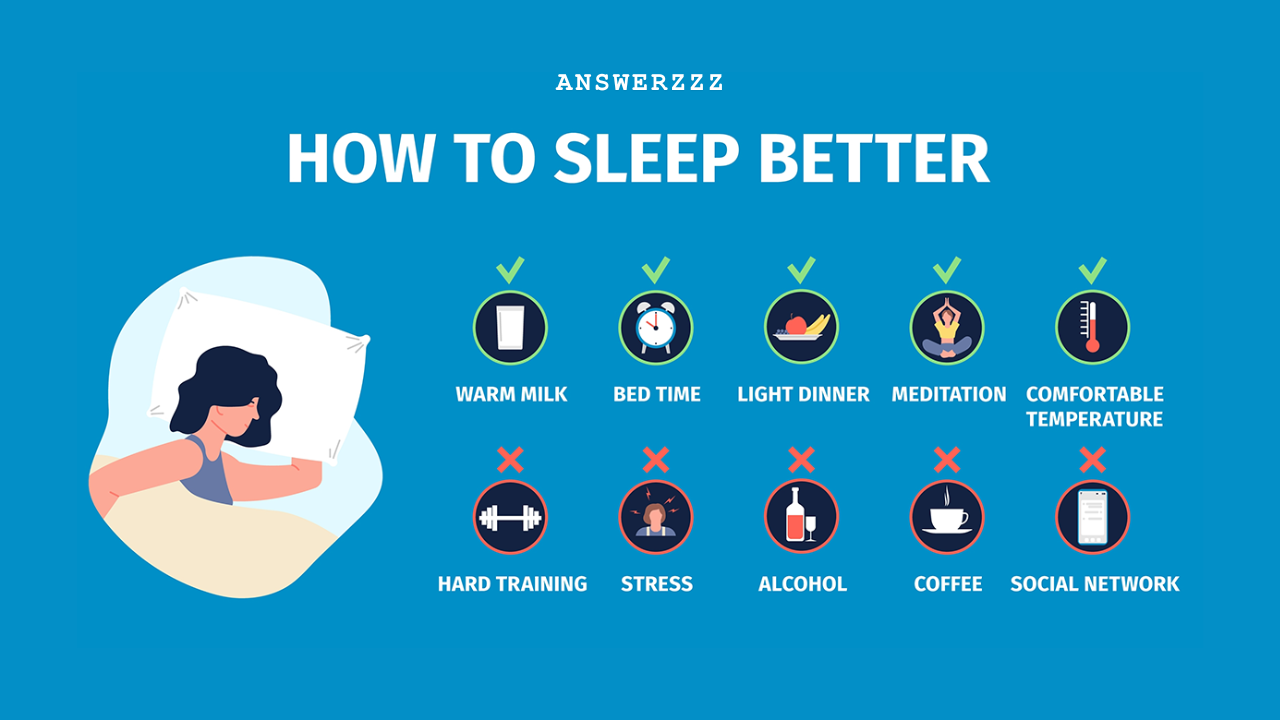In our fast-paced modern world, sleep often takes a backseat to our busy lives, resulting in increased stress and a decline in overall well-being. According to the Centers for Disease Control and Prevention (CDC), one in three adults does not get enough sleep. Quality sleep is essential for maintaining mental clarity, emotional stability, and physical health. This article provides comprehensive tips and strategies to help you achieve a restful night’s sleep, ensuring you wake up refreshed and ready to tackle the day.
Understanding Sleep
Before diving into tips for better sleep, it’s essential to understand what sleep is and why it matters. Sleep is a naturally recurring state of mind and body characterized by altered consciousness, relatively inhibited sensory activity, reduced muscle activity, and inhibition of most voluntary muscles during REM sleep. It plays a crucial role in various bodily functions, including:

- Physical health: Sleep is vital for healing and repairing your heart and blood vessels. Chronic sleep deprivation can lead to serious health problems, including obesity, heart disease, and diabetes.
- Mental health: Sleep significantly impacts mood, stress levels, and cognitive function. Lack of sleep can lead to anxiety, depression, and decreased focus.
- Immune function: Sleep is crucial for maintaining a healthy immune system, as it helps the body fight off infections and diseases.
Recognizing the Importance of Sleep Hygiene
Sleep hygiene refers to the practices and habits that are conducive to sleeping well regularly. Establishing good sleep hygiene is key to improving sleep quality. Here are the essential components of sleep hygiene:
1. Create a Sleep Schedule
- Consistent Sleep and Wake Times: Going to bed and waking up at the same time every day, including weekends, helps regulate your body’s internal clock. Aim for 7-9 hours of sleep each night.
- Limit Naps: If you need to nap, keep it short (20-30 minutes) and avoid napping late in the afternoon to prevent disrupting your nighttime sleep.
2. Design Your Sleep Environment
- Comfortable Bedding: Invest in a comfortable mattress and pillows that suit your sleeping position. Ensure your bedding is clean and inviting.
- Optimal Room Temperature: Keep your bedroom cool, ideally between 60 and 67 degrees Fahrenheit. A cooler environment can promote better sleep.
- Minimize Noise and Light: Use blackout curtains to block out light and consider earplugs or a white noise machine to drown out disruptive sounds.
- Create a Relaxing Atmosphere: Keep your bedroom tidy and free from distractions. Incorporate calming colours and soft lighting to make your sleep space inviting.
3. Limit Exposure to Screens Before Bed
- Reduce Blue Light Exposure: The blue light emitted by phones, tablets, computers, and TVs can interfere with the production of melatonin, the hormone responsible for sleep. Aim to turn off screens at least one hour before bedtime.
- Establish a Pre-Sleep Routine: Create a calming routine before bed that doesn’t involve screens. Consider activities such as reading, meditating, or taking a warm bath to signal your body that it’s time to wind down.
Nutrition and Lifestyle Choices for Better Sleep
The food and drinks you consume can significantly impact your ability to fall and stay asleep. Here are some recommendations for optimizing your diet for better sleep:
4. Mind Your Diet
- Avoid Heavy Meals Before Bed: Eating large or spicy meals close to bedtime can cause discomfort and disrupt sleep. Aim to finish eating at least two to three hours before sleep.
- Limit Caffeine and Nicotine: Both substances are stimulants that can interfere with sleep. Try to avoid them in the hours leading up to bedtime, especially in the afternoon and evening.
- Be Cautious with Alcohol: While alcohol might help you fall asleep initially, it can disrupt your sleep cycle later in the night. If you choose to drink, do so in moderation and avoid it close to bedtime.
5. Incorporate Sleep-Promoting Foods
Certain foods can help promote better sleep. Consider incorporating the following into your diet:
- Complex Carbohydrates: Foods like whole grains, oatmeal, and brown rice can increase serotonin levels, aiding in sleep.
- Lean Proteins: Foods rich in protein, such as poultry, fish, and legumes, can help promote the release of sleep-regulating hormones.
- Fruits and Vegetables: Foods like bananas, cherries, and spinach are excellent choices as they contain nutrients that can aid in sleep.
Managing Stress and Anxiety

Stress and anxiety are common culprits of sleep disturbances. Learning how to manage stress can significantly improve your sleep quality. Here are some techniques to consider:
6. Practice Relaxation Techniques
- Deep Breathing: Engage in deep breathing exercises to calm your mind and body. Try inhaling for four counts, holding for four counts, and exhaling for four counts.
- Progressive Muscle Relaxation: Tense and relax each muscle group in your body, starting from your toes and working your way up. This technique can help release tension and promote relaxation.
- Mindfulness and Meditation: Practicing mindfulness or meditation can help you focus on the present moment and reduce racing thoughts that may keep you awake.
7. Incorporate Physical Activity
- Regular Exercise: Engaging in regular physical activity can help reduce stress and anxiety levels. Aim for at least 150 minutes of moderate aerobic exercise each week, but try to avoid vigorous workouts close to bedtime, as they may be stimulating.
- Gentle Evening Exercises: Consider incorporating gentle exercises like yoga or stretching in the evening to promote relaxation and prepare your body for sleep.
Utilizing Natural Sleep Aids
In addition to lifestyle changes, some people find success using natural sleep aids to enhance their sleep quality. Here are some options to consider:
8. Herbal Supplements
- Chamomile: This herb is known for its calming effects and can be consumed as tea before bed.
- Valerian Root: Often used for its sedative properties, valerian root can help improve sleep quality when taken as a supplement.
- Melatonin: This hormone is naturally produced by the body to regulate the sleep-wake cycle. Supplementing with melatonin may help those struggling with insomnia or jet lag.
9. Aromatherapy
- Essential Oils: Certain scents, such as lavender and chamomile, are known for their calming properties. Consider using an essential oil diffuser or applying diluted essential oils to your skin before bed to promote relaxation.
Recognizing Sleep Disorders
Sometimes, persistent sleep issues may indicate an underlying sleep disorder. It’s essential to be aware of the signs of common sleep disorders:
10. Insomnia
Insomnia is characterized by difficulty falling asleep, staying asleep, or waking up too early. If you experience insomnia regularly, it’s crucial to speak with a healthcare professional.
11. Sleep Apnea
Sleep apnea is a serious condition where breathing repeatedly stops and starts during sleep. Common symptoms include loud snoring, gasping for air during sleep, and excessive daytime sleepiness. If you suspect you may have sleep apnea, consult a healthcare provider for evaluation.
12. Restless Legs Syndrome (RLS)
RLS is a condition characterized by an uncontrollable urge to move the legs, often accompanied by uncomfortable sensations. If you find it challenging to keep your legs still while trying to sleep, seek medical advice.
Building a Better Sleep Routine
Creating a consistent sleep routine can help signal your body that it’s time to wind down. Here’s how to develop a personalized sleep routine:
13. Set a Wind-Down Time
- Designate a Time for Relaxation: Choose a specific time each evening to begin your wind-down routine. This should be around the same time each night to reinforce your body’s sleep-wake cycle.
- Engage in Relaxing Activities: Incorporate calming activities into your routine, such as reading, journaling, or practising gentle yoga.
14. Limit Fluid Intake Before Bed
- Stay Hydrated During the Day: Ensure you drink enough fluids throughout the day, but limit your intake in the evening to reduce the likelihood of nighttime bathroom trips that can disrupt sleep.
15. Use Your Bed for Sleep Only
- Establish a Sleep Association: Reserve your bed for sleep and intimacy only. Avoid working, watching TV, or engaging in stimulating activities in bed to reinforce the association between your bed and sleep.
Simple Fitness Tips for Busy Schedules: Stay Fit Without the Gym
Final Thoughts
Improving your sleep quality is crucial for maintaining overall health and well-being. By implementing these tips and strategies, you can create an environment and lifestyle that promotes restful sleep. Remember that it may take time to establish new habits, so be patient with yourself as you work towards better sleep.
If you continue to experience sleep difficulties despite making these changes, it’s essential to seek professional help. A healthcare provider can help identify any underlying issues and provide tailored recommendations to support your sleep health. By prioritizing sleep, you’ll not only enhance your physical and mental health but also improve your quality of life, leading to more productive and fulfilling days ahead.





